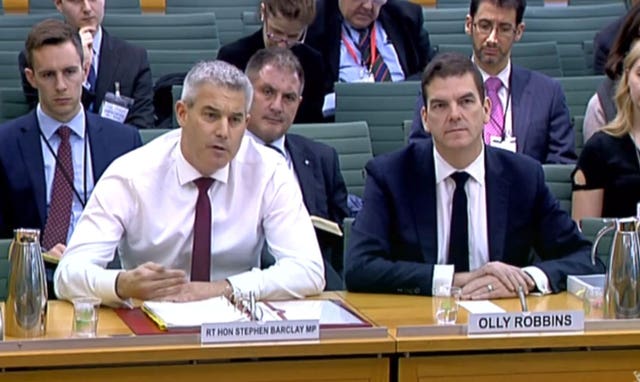Backstop is uncomfortable necessity, says May adviser as legal papers are released
The 43-page document says that an Irish border backstop in the event of a no-deal Brexit would remain until a new agreement is made.

An Irish border backstop installed in the case of a no-deal Brexit would continue to apply “unless and until it is superseded” by a new agreement, Government legal advice says.
The position statement released on Monday afternoon also said Britain faced paying extra money to the European Union if the implementation period after the UK leaves in March has to be extended.
The 43-page Legal Position On The Withdrawal Agreement was published after the Government lost a Parliamentary vote calling for the full legal advice to be released.
It came after Theresa May had told Tory MPs to “hold their nerve” and back her Brexit deal, insisting she would still have a job in two weeks’ time as she faces a crunch December 11 Commons vote on her EU Withdrawal Agreement.
The dense legalese paper states that the backstop “protocol”, which would see the whole of the UK enter into a customs arrangement with the EU, would come into effect in December 2020 “in the event that a subsequent agreement is not in place by then, and the protocol will continue to apply unless and until it is superseded, in whole in or part, by a subsequent agreement establishing alternative arrangements”.
However, it goes on to say that “if it does start to apply then it should do so only temporarily”.
The document was released ahead of statements to MPs due to be made by the Prime Minister and the Government’s chief legal officer, Attorney General Geoffrey Cox, on Monday afternoon.
Earlier Mrs May’s chief Brexit adviser told MPs that the Northern Ireland border backstop was a “slightly uncomfortable necessity” for both the UK and the European Union.
The fallback plan agreed with Brussels was “not the future relationship that either the UK or the EU wants to have with one another”, Olly Robbins told the Exiting the European Union Committee.
He said: “It is an uncomfortable position for both sides and the reality … is that there is not a withdrawal agreement without a backstop.
“That reflects also, as I’ve said to this committee before, ministers’ commitments to Northern Ireland and to avoid a hard border on the island of Ireland, rather than being something imposed upon us.
“So, it is a necessity and a slightly uncomfortable necessity for both sides.”

Asked if the Government had drafted a clause for the Withdrawal Agreement which would have allowed the UK to opt out of the backstop unilaterally, Mr Robbins said: “Ministers asked us to look at a whole range of options for how to bring the backstop to an end, and so we did.
“And the Prime Minister and other ministers tested some of those out on European partners.
“But, what we went into the negotiation with in the end was a text that delivered the termination clause very much as it is laid out there.”
The UK faces making additional payments to Brussels if the Brexit implementation period is extended, the Government’s Brexit legal advice also said.
Under the terms of the Withdrawal Agreement, it is due to run until the end of December 2020 but can be extended by up to two years if both sides agree.
The advice says that discussions on any extension would involve “reaching further agreement on the UK’s financial contribution”.
Labour’s Chris Bryant, a supporter of the People’s Vote campaign for a second referendum, attacked the paper’s release when MPs had demanded to see the full legal advice given to ministers by Mr Cox.
He said: “The House of Commons was very clear that the full legal advice to the Cabinet should be supplied to Members of Parliament.
“The refusal of the Government to comply sends a very clear message about the Brexit deal – that it is bad for Britain, satisfies nobody and will weaken our economy and our voice in the world.”





